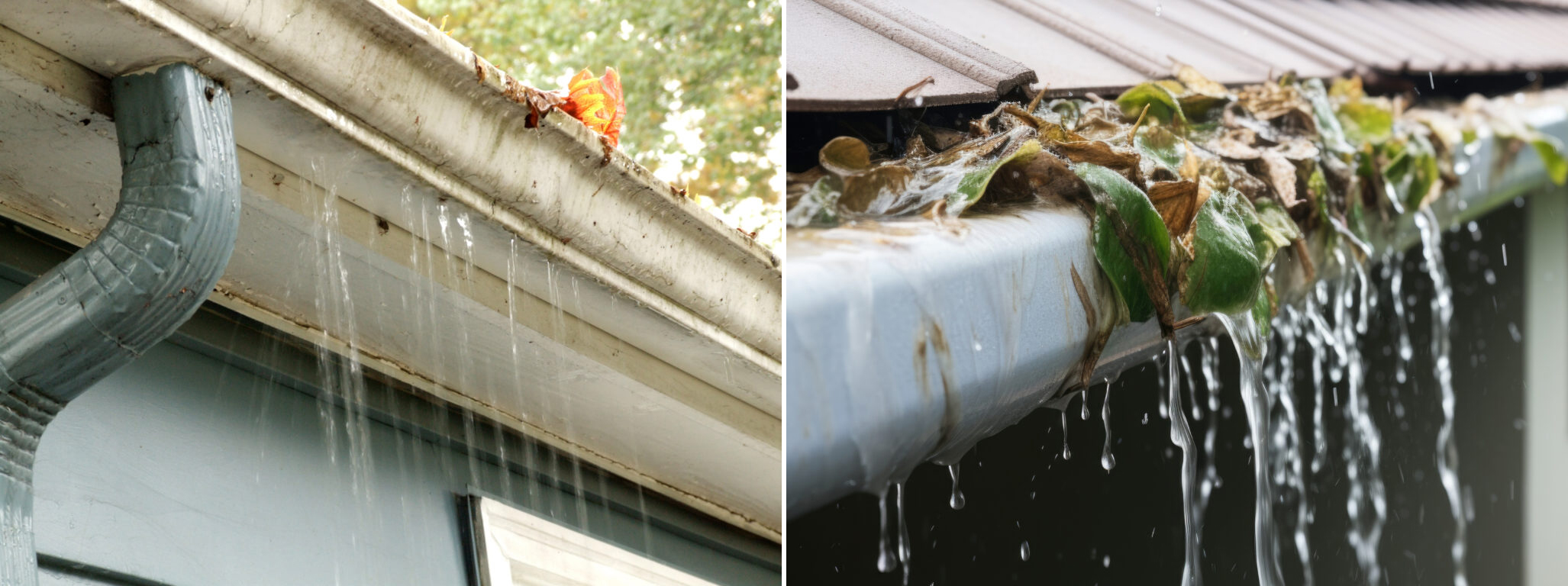 The Dangers of Clogged Gutters and Why You Should Keep Them Clean
The Dangers of Clogged Gutters and Why You Should Keep Them Clean
Posted on Friday, October 11, 2024
Categories:
Home Maintenance
Gutters are a crucial part of your home’s drainage system, designed to channel rainwater away from your roof, walls, and foundation. However, when gutters become clogged with leaves, twigs, dirt, or other debris, they can cause a cascade of problems that affect both the exterior and interior of your home. Regular maintenance of your gutters is essential for preventing costly damage. Here’s a detailed look at the potential damage and ill effects clogged gutters can cause and why it’s so important to keep them clear.
1. Roof Damage
Gutters are meant to direct water away from your roof, but when they’re clogged, water has nowhere to go. As a result, it can pool on your roof, seeping under shingles and leading to rot, leaks, or even ice dams during colder months. Over time, this can significantly weaken your roof structure and may require expensive repairs or a premature roof replacement.
How it happens: When water overflows due to clogged gutters, it stays on the roof, increasing the risk of moisture buildup. During the winter, this can lead to ice dam formation, where melting snow refreezes, further damaging shingles and roof underlayment.
2. Foundation Issues
Water overflowing from clogged gutters falls directly around the foundation of your home. Over time, this can cause foundation cracks, weaken the structural integrity of your home, and lead to expensive repair costs.
How it happens: Gutters are designed to funnel rainwater far away from your home’s base. But when they are clogged, water can accumulate around the foundation. In worst-case scenarios, constant water exposure can lead to soil erosion and foundation shifts, resulting in cracks in the foundation walls.
3. Basement Flooding
A direct consequence of foundation problems is basement flooding. As the foundation weakens and cracks, water can seep into your basement, leading to extensive water damage, mold growth, and even electrical hazards.
How it happens: Poorly maintained gutters allow rainwater to pool around the base of your home, which can seep through cracks or gaps in your basement walls. The water can cause structural issues as well as ruin stored items, furniture, or appliances.
4. Exterior and Siding Damage
Overflowing water from clogged gutters doesn’t just pool around your foundation; it can also cascade down the sides of your house. Over time, this can damage your home’s siding, causing peeling paint, rotting wood, and unsightly stains on brick or vinyl siding.
How it happens: When water isn’t channeled away properly, it runs down the side of your home, drenching your exterior walls repeatedly. This constant moisture can lead to mildew, mold growth, and the deterioration of wooden siding or trim.
5. Landscape Erosion
Your carefully maintained landscaping can also suffer from clogged gutters. As water overflows and spills out, it can drown plants, cause soil erosion, and create muddy patches. This not only affects the beauty of your yard but can also lead to issues with drainage.
How it happens: When water flows uncontrolled from the gutters, it can wash away soil and mulch, damage flower beds, and drown plants. Your yard’s drainage may also be compromised, leading to pooling water or swampy areas.
6. Increased Pest Problems
Clogged gutters filled with damp debris create the perfect environment for pests to breed. Birds, rodents, insects, and mosquitoes can find your clogged gutters an inviting space to nest, leading to more problems around your home.
How it happens: Damp leaves and other organic matter attract insects and rodents. These pests can spread diseases or chew through roofing materials, wiring, and even enter your home.
7. Mold and Mildew Growth
Standing water in clogged gutters can lead to mold and mildew growth, which can eventually spread into your home. Mold and mildew pose serious health risks, especially to those with allergies, asthma, or respiratory conditions.
How it happens: Moisture buildup in clogged gutters creates an environment ripe for mold growth. As this mold spreads to your walls, attic, or basement, it can degrade air quality and contribute to various health issues.
8. Gutter and Fascia Damage
Overflowing water can weigh down gutters and the fascia boards that support them. If the weight becomes too great, it can cause your gutters to sag, pull away from your home, or even collapse entirely.
How it happens: Water-soaked debris and the added weight of standing water strain the gutter system. Over time, this can cause sagging gutters, warped fascia, and even complete gutter failure.
CONCLUSION: Regular Maintenance Is Key
The best way to prevent these costly and potentially hazardous problems is through regular gutter maintenance. Cleaning your gutters at least twice a year—especially in the fall when leaves are abundant—can help prevent clogs. Installing gutter guards is another effective way to minimize debris buildup.
In the long run, investing time and effort into keeping your gutters clear will protect your home from extensive damage and costly repairs. Whether you choose to clean them yourself or hire a professional, the benefits far outweigh the risks of neglecting this critical part of your home’s drainage system.
Tagged:gutters and downspouts, maintenance